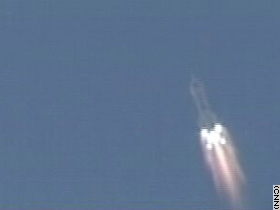China's official news agency reported that the spacecraft's systems were working properly and that contact had been made with the astronaut
Compilation from various sources: Avi Blizovsky

Street in Jiuquan, the city from which the spacecraft was launched, yesterday
China successfully launched the first manned spacecraft in its history early this morning (Wednesday). China's official news agency, "Xinhua", reported that the spacecraft, Shenzhou 5 (also known as the "Heavenly Ship") entered its orbit around the Earth, and will remain in space 21- about hours. The spacecraft entered its orbit outside the atmosphere 10 minutes after liftoff.
Leaving a trail of white smoke behind it, the "Shenzo 5" spacecraft took off from the Gobi desert in northwestern China at exactly 3:00 a.m., with astronaut Yang Livi, a 38-year-old lieutenant colonel in the Chinese Air Force, on board. The spacecraft is expected to circle the Earth 14 times before landing back on Earth after about 21 hours

The Chinese news agency reported that after the spacecraft entered orbit, contact was made with the astronaut, who said: "I feel good and my conditions are normal."
Lee-Wee said after the launch that he felt good. Tests he conducted on himself revealed that all the systems in his body were working properly. "I will not disappoint the motherland", he said before his departure. "I will perform every movement with absolute concentration, and I will win respect for the People's Liberation Army and for the Chinese nation."
The President of China, Hu Jintao, called the launch "the great glory of our motherland". "The party and the people will never forget those who set this extraordinary milestone in the space industry for the motherland, the people and the nation," he said.
Chinese President Hu Jintao and his predecessor, Jiang Zemin, who renewed the manned spacecraft program in 2991, were supposed to come to the launch center yesterday and meet the astronaut selected for the mission, but they shut themselves in Beijing at the party convention, which ended yesterday.
Guo Yidong, director of China's Space Applications Systems, said the launch was just a "first step" toward more ambitious missions. Meanwhile, China is concentrating on more modest tasks, such as improving satellite services and meteorological forecasts.
In the future, China also plans to launch a research satellite into space, reach the moon and establish a space station. The shares of the Chinese International Aerospace Corporation, which are traded on the Hong Kong Stock Exchange, rose by 16 on Tuesday, with the expectation that the government will increase its investments in the space industry.
The security around the facility in the Gobi desert in the day before the launch was heavy. The road leading to the facility was full of military vehicles, but buses full of civilians who came to the area hoping to watch the event were allowed to approach.
China's space agency has so far successfully launched four unmanned rockets into space, orbiting the Earth for about a week. "The Chinese people have long awaited the launch of "Shenzo 5", said the spokeswoman of the Ministry of Foreign Affairs of China, adding that this is a key step in the Chinese development of space exploration - "for peaceful purposes".
Russia: Welcome to the Club (YNET)
The Deputy Director of the Russian Space Agency, Nikolai Musayev, congratulated China on the launch of the spacecraft. Musayev wrote in a message that he published that "Russia congratulates China for joining the space club, where until now only two countries have been members."
The message also states that Russia and China have been cooperating in the field of space for more than a decade, and that Chinese astronauts have been trained in Russian facilities.
NASA also congratulates (GLC)
The director of the American space agency Sean O'Keefe congratulated the Chinese: "The launch is an important achievement in the history of human exploration and NASA wishes a safe continuation of China's space program", O'Keeffe said. The launch was not broadcast live, since Beijing feared mishaps at the moment of truth.
China: The first astronaut will be launched between October 15 and 17 (update)

